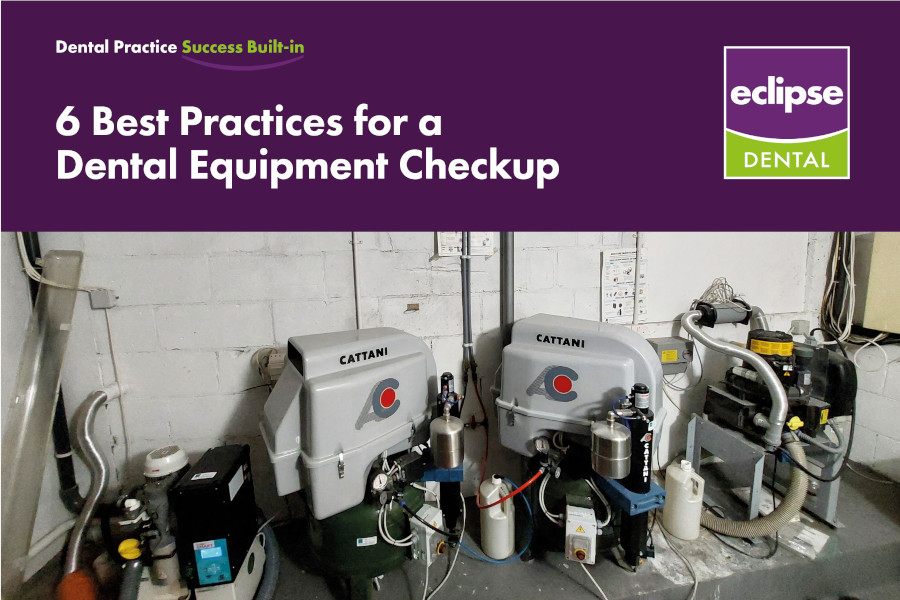
Dental equipment maintenance is crucial for any dental practice.
Proper care and maintenance of dental equipment help to ensure the health and safety of patients and staff, optimises performance and prevent costly repairs or early replacement.
This guide to dental equipment maintenance provides tips that every dentist should follow.
Here’s a quick rundown of some simple yet crucial maintenance tasks you should be doing regularly:
Lubricate handpieces: Handpieces should be lubricated after each use according to the manufacturer’s instructions. Proper lubrication helps prevent overheating and extend the lifespan of handpieces.
Disinfect suction lines: Suction lines should be cleaned with an enzymatic cleaner and disinfected regularly to prevent the buildup of biofilm.
Calibrate X-ray equipment: Dental X-ray equipment needs regular calibration and maintenance to ensure optimal image quality and radiation safety.
Change ultrasonic water: The water in ultrasonic scalers should be changed frequently, such as between each patient, to help prevent cross-contamination.
Inspect handpiece tubing: Air and water tubes connecting to dental handpieces should be inspected for wear and tear and replaced as needed.
These tasks might seem small, but they’re the building blocks of a well-maintained dental practice.
They help prevent the need for more costly repairs or replacements down the road.
A maintenance checklist is a schedule of regular maintenance tasks that should be performed at specific time intervals.
Checklists help ensure that critical maintenance does not get overlooked.
Here are some items that should be on the checklist:
| Maintenance Task | Frequency |
|---|---|
| Operatory surface disinfection | Between patients |
| Handpiece lubrication | Daily |
| Sterilizer maintenance | Daily, Weekly, Monthly |
| Suction line cleaning | Weekly |
| Ultrasonic cleaner testing | Weekly |
| Handpiece inspection | Monthly |
| Suction filter changes | Monthly |
| Dental unit waterline treatment | Monthly |
| Biofilm testing | Quarterly |
| Air compressor maintenance | Annually |
| X-ray service | Annually |
| X-ray critical examination | Every 3 years |
Maintenance checklists should include the task, frequency, and who is responsible.
Posting a checklist prominently in the sterilisation area helps reinforce consistent completion of maintenance.
Make it a habit to give your equipment a good once-over on a regular basis. Keep a meticulous record of any problems, repairs and replacements. Don’t forget to jot down any downtime and make sure to pick the brains of your team for their feedback.
Now, here’s a nifty idea: set up a rating system for each unit. This will help you figure out which item might be first in line for replacement and can also serve as an early warning. Staying on top of the telltale signs of wear and tear can help you squirrel away funds for a replacement.
Check out the infographic below for our top six best practices. You can grab a PDF version right here to print and pin up in your plant room.
There are several crucial reasons why proper dental equipment maintenance is so important:
Neglecting proper maintenance puts patients at risk, decreases equipment longevity and results in unnecessary expenses for dental practices.
Investing a little time in regular equipment care goes a long way!
Taking care of your dental equipment isn’t just good practice—it’s a must.
Following proper care and maintenance guidelines helps dental equipment last longer, decreases the risk of infection, and provides the best quality of care to patients.
Take a look at this checklist of suitable dental equipment cleaning products.
Every dental practice needs to be as clean as a whistle, and that includes your dental chairs. To keep them in tip-top shape, you’ve got to play by some pretty specific rules and regulations.
To help you out, we’ve put together a Dental Chair Care & Cleaning Guide. It’s packed with tips and common pitfalls to avoid when cleaning and maintaining your throne. Follow these suggestions, pair them with an annual service plan, and your chair will serve you faithfully for years to come.
Your plant machinery needs a monthly check-up to keep running smoothly. This can be done by your specially trained practice staff.
But remember, an annual check-up should be performed by qualified and experienced engineers.
Our Plant Machine Care & Cleaning Guide has all the info you need, straight from the manufacturer’s maintenance and cleaning manuals for air compressors and suction pumps.
And our free fault finding guides are designed to be pinned to the wall for quick access and provides immediate, easy-to-follow solutions, enabling quick diagnostics and on-site fixes to keep your operations running smoothly.
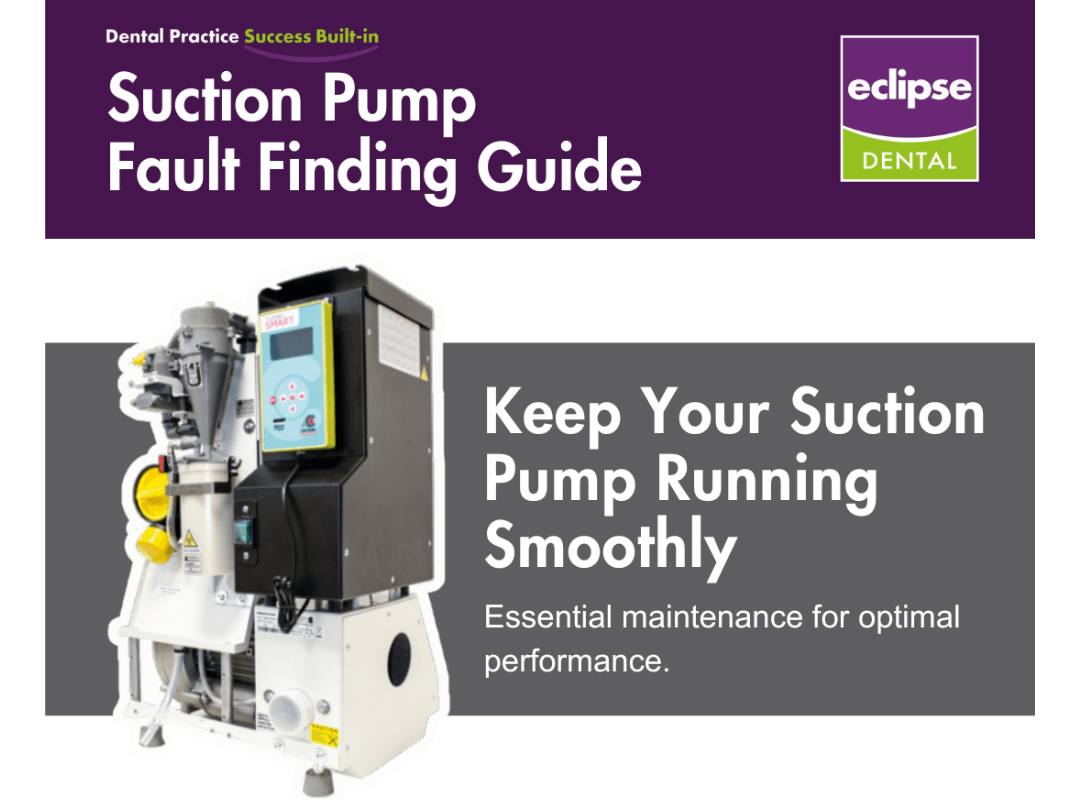
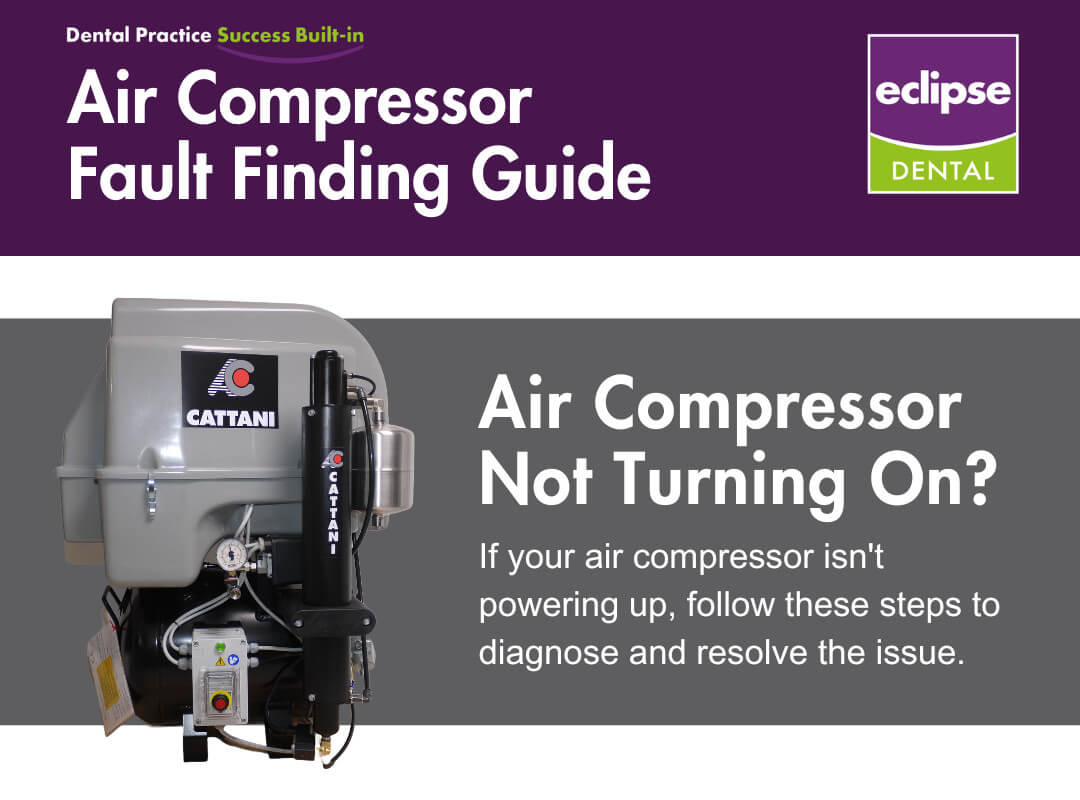
Cabinetry and worktops aren’t just for storage—they’re designed to make the most of your space, whether it’s in the surgery or decontamination room.
They’re sleek, minimal and made from durable materials that can be easily disinfected. This means efficient cleaning between patients, freeing you up to focus on other tasks.
Our Dental Cabinetry Care & Cleaning Guide has got you covered on the ins and outs of caring for Durasein / Corian worktops, Corian sinks, laminate worktops, drawers, doors and stainless steel sinks.
Dental engineers are the unsung heroes of a dental practice. They keep your essential machinery humming along and help avoid costly downtime that might result from equipment failure.
All your equipment will need some TLC and servicing. If you follow the manufacturer’s guidelines, they should last you several years.
But let’s face it, sometimes things go wrong. Equipment malfunctions or breaks down completely.
That’s when dental engineers step in. They’re your lifeline when it comes to avoiding costly downtime and keeping your vital equipment in working order. They’re an invaluable resource for dental practices.
Think of your dental equipment like a car—it needs a professional check-up and service at least once a year. Handpieces and other intraoral gadgets might need a tune-up as often as every six months, especially if they’re getting a good workout.
But remember, it’s not just about professional servicing. You’ve also got to follow the manufacturer’s recommendations for each piece of equipment. And don’t forget about the routine self-maintenance—it should be performed more frequently, like daily or weekly.
Want to know more about why annual equipment servicing is a big deal? Check out our article – Do I Need to Have My Dental Equipment Serviced?
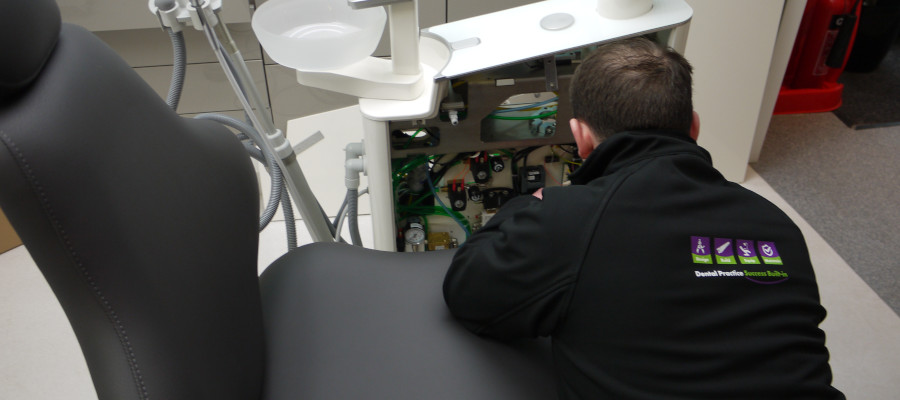
Having a qualified dental technician give your equipment the once-over can help spot potential problems before they turn into full-blown breakdowns. It’s a good idea to schedule these preventive maintenance sessions during your quieter periods to minimise disruption to patient care.
Investing in professional servicing and repairs is like buying insurance—it helps avoid costly downtime and keeps your equipment humming along for longer. It’s the peace of mind that comes with knowing your equipment is functioning safely and accurately.
Keeping your dental equipment in tip-top shape is all about establishing a routine maintenance schedule.
Here’s how to do it:
Maintaining organisation through the use of checklists, logs and reminders ensures your maintenance tasks are managed efficiently and effectively.
And the best part? Your patients benefit from equipment that’s always in prime working condition.
While your dental staff can handle the routine maintenance, it’s a smart move to have your equipment professionally serviced by a technician. Here’s why:
Picture your dental surgery. It’s decked out with all sorts of essential and complex equipment. Now, imagine if one of these mechanical marvels conks out or breaks down completely.
The surgery might have to close its doors. Then, it’s up to the dentist or practice manager to call in an engineer to fix the dental equipment.
Sometimes, this can take longer than you’d like, costing the practice a pretty penny and potentially leaving your customers less than thrilled.
In a perfect world, the dental equipment engineer would understand the need for speed. They’d show up at the practice with a shiny new machine in their van, ready to replace the unrepairable one.
If the repairs can’t be done on-site, the machine can be whisked away to the workshop, and the new machine can be left as a loaner.
Investing in professional servicing provides quality control while freeing up staff for other duties. It helps optimise equipment performance and longevity.

Being proactive with preventative maintenance is like having a secret weapon against equipment emergencies.
For a dental practice, it’s all about stopping equipment breakdowns before they happen. It’s a lot more efficient than playing catch-up with repairs.
The saying from Benjamin Franklin, “An ounce of prevention is worth a pound of cure” could be the motto of dental equipment maintenance. Dodging unexpected downtime is definitely worth the effort of proactive care.
Fixing dental equipment can be costly, especially if the unit is an old-timer. Then you’re left with a choice: do you swap it out for a shiny new model or keep it chugging along a bit longer?
Before you make the call, check the equipment’s age, how much it’s been used, its warranty status and any faults (including those that have been fixed and those that keep popping up).
And don’t forget to check out our article ‘Common Equipment Breakdowns and Why They Occur’. It’s got the lowdown on frequently reported issues and sage advice from our engineers.
Also, take a look at this page, Dental Equipment: Repair or Replace, for more info, including our engineer’s top tips and answers to commonly asked questions.
Meticulous documentation is crucial for dental equipment maintenance. Here’s why it matters:
Thorough documentation demonstrates a commitment to quality care and helps optimise equipment function. It’s worth the minimal extra time needed.
Remember, regular servicing and proper maintenance aren’t just chores to tick off a list. They’re the secret sauce to keeping your dental equipment running smoothly for the long haul, ensuring the comfort of your patients and the smooth running of your practice.
We’ve also shone a spotlight on the importance of being ready for those unexpected equipment failures with our emergency call-out service. Because let’s face it, it’s always better to be safe than sorry, right?
So, are you geared up to shower your dental practice’s equipment with the TLC it deserves? Are you ready to invest in its well-being and, by extension, the success of your practice?
Don’t worry, we’ve got your back every step of the way.
Caring for dental equipment properly is an essential practice for every dental office. Here are the key takeaways:
Investing a little time in equipment care goes a long way for patient safety, quality of care and the dental practice’s bottom line. Proper maintenance pays dividends.
1. Why is routine care and maintenance important for dental equipment efficiency?
Proper routine care and maintenance play a crucial role in ensuring the efficiency and longevity of dental equipment. Regular maintenance helps prevent breakdowns, minimize downtime, and extend the lifespan of the equipment.
2. What does routine care and maintenance of dental equipment involve?
Routine care and maintenance of dental equipment involve following a maintenance checklist provided by the equipment manufacturer. This may include cleaning, lubricating, inspecting, and servicing various components and systems of the equipment.
3. How often should dental equipment undergo routine maintenance?
The frequency of routine maintenance depends on the type of equipment and the manufacturer’s recommendations. Typically, dental equipment should undergo maintenance at regular intervals, such as quarterly, semi-annually, or annually.
4. What are the consequences of neglecting routine care and maintenance?
Neglecting routine care and maintenance can lead to various issues, including equipment malfunction, decreased efficiency, increased risk of breakdowns, higher repair costs, and potential risks to patient safety. It is important to prioritize regular maintenance to avoid these consequences.
5. How can routine care and maintenance prevent costly repairs?
By conducting routine care and maintenance, potential issues can be identified and addressed early on, minimizing the chances of major breakdowns or equipment failures. Preventative maintenance helps catch small problems before they become more significant and expensive to fix.
6. Should I rely solely on the manufacturer’s maintenance guidelines?
While it is essential to follow the manufacturer’s maintenance guidelines, you can also consult with a dental equipment technician or specialist for additional guidance. They can provide valuable insights and recommendations based on their expertise and experience.

I have used them for the first time in recent months for a complicated project in carrying out a practice refurbishment. Eclipse were meticulous and brilliant. Very knowledgable engineers and a beautiful finish to my practice. They really are a family based business who will look after you. Very professional company and will definitely keep using them.

I had my 2 surgery practice completely stripped out and services repositioned with new flooring, new equipment and redecorated. They kept to the agreed time scale and we were up and running in our state-of-the-art new surgery. Thank you Eclipse and I will be using your services again.

I did a lot of research looking for a dental fit-out company before I came across Eclipse Dental. They designed the surgery exactly the way I wanted it to look which suits my requirements perfectly. The final result was phenomenal, just phenomenal!

The engineers that attend our practice are very knowledgeable and always act in a professional manner. If we have an emergency situation John Boyt always tries his best to fit us in. I have no hesitation in recommending Eclipse Dental Engineering to you for all your servicing and breakdown needs.

Eclipse listened to my ideas, they added a lot to them and improved my initial design. They had loads of realistic and creative ideas for a 21st century dental practice! Two surgeries were refurbished on time without any interruption of our clinics.

We would highly recommend the awesome Eclipse team who guided us through the design process, finishing touches and colour schemes. Their ability to combine build works with equipment and dental engineering makes it so much easier and better value.

I am very pleased with the result, it is of a high quality and surpassed my expectations, on the strength of the work done I commissioned some extra wall cabinetry. The whole process was hassle-free and I would be very happy to recommend Eclipse to my friends in the business.
We used Eclipse recently in an emergency as we had equipment failure. They were very quick to respond to our call and were able to get us working again within 2 hours. The engineer was very friendly and professional and I would highly recommend this company.

I would like to express my gratitude to you and your team for your professionalism and prompt response when our dental chair packed up. You attended the same day, removed the damaged chair and installed a rental to allow us to continue practising.
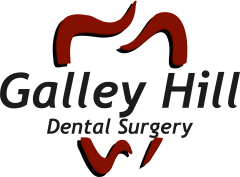
Having dealt with many fit-out companies over the years, Eclipse Dental has been one of the most professional, dependable and sincere companies I have ever worked with. I would not hesitate to use their services again.
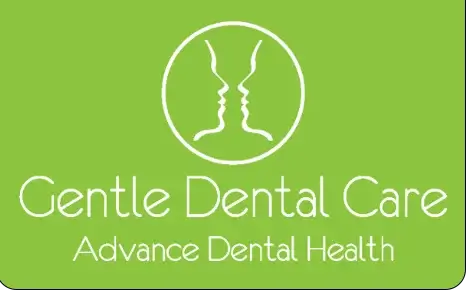
Excellent service, Eclipse have worked tirelessly for us and have always come out same day if we have a problem stopping us working. Thanks to all at Eclipse.
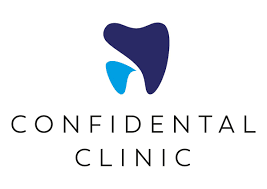
Their awareness of CQC regulations regarding equipment relocation and our necessity to minimise downtime was brilliant. We would like to recommend Eclipse Dental to anyone considering a refurbishment or relocation.
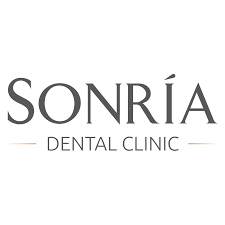
Very happy with the service and reliability of the team. From the beginning to the end, everyone was always helpful and very kind. I definitely will recommend Eclipse Dental!

I liked how swiftly the projects were done. Everything was managed, everything was timed and everything was coordinated. And every day we saw something happening. It was very exciting.

The quality of craftsmanship was exceptional—the cabinetry, flooring and all custom elements were made precisely to our specifications and aligned perfectly with our vision for the space.

Brilliant. Just professional! Complete refit of surgery. Flawless.

The boys did well! We didn’t give them much time to prepare but they did a great job, extremely pleased.

We have had the chairs for some time now and are happy with them. They serve what we need them for. The aftercare service is excellent

Eclipse are very flexible and listen to your needs. We are very impressed with the quality of workmanship they delivered. I would not hesitate to continue recommending Eclipse.
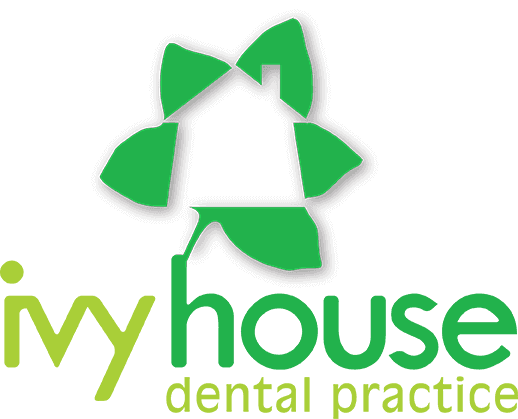
Eclipse were always accommodating of any requests and would always go the extra mile. I look forward to working with them for many years to come.

We are delighted with the end result. The practice looks good and, more importantly, works ergonomically and efficiently.